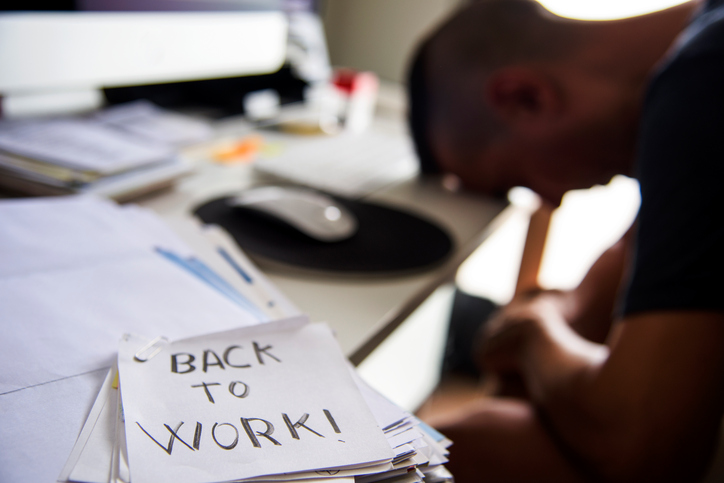Getting back to routine is never easy, especially when we have the image of the beach and a few cold beers at the beach bar still etched in our minds. “Back to School” can be an uphill struggle and many find it difficult to get back on track. Tiredness, insomnia, and irritability are all symptoms that can crop up when going back to work after the holidays.
But, how can you make it easier, and better manage the return to your work routine?
Stress can be positive when stress it you to adapt to a conflict situation, improves your attitude towards it and helps you to be successful. However, the problem arises when this response is fruitless, not only does it stop us from moving forward, but it also blocks or paralyses us when faced with a situation of change. This second scenario is prevalent in the work environment, especially after returning from holidays, so we need to know how to recognise it and battle against it, so it doesn’t affect our performance or health.
According to the American Psychological Association, there are 3 types of stress:
- Acute stress. This is the most common form. It’s brought on by demands and pressures of the recent past and those anticipated in the near future. Common symptoms include irritability, anxiety and depression. Anyone can suffer from acute stress, but the good news is that it’s easy to manage.
- Episodic acute stress. This is found in people who suffer from acute stress frequently. Symptoms include persistent tension headaches, migraines, high blood pressure and heart disease. Treating episodic acute stress requires long-term professional help.
- Chronic stress. This appears when a person can’t see a way out of a miserable situation that becomes internalised in such a way that it’s difficult for the patient to identify it. This type of stress requires professional help. The road to recovery is often long and complicated.
According to Judit Calpe, medical director and family doctor at mediQuo – a 24/7 medical chat app –, “the important thing with stress is to prevent it from appearing and negatively affecting our lives”. Judit gives us with some tips to help getting back to the grind less stressful, now, these tips may not work for everyone as each person’s body and mind is a world, but they’re a good starting point:
- Watch what you eat. A healthy diet is the best source of energy! Fruits, vegetables and pulses are your greatest allies as they have a high content of carbohydrates that are easily absorbed and provide an energy boost that will last a couple of hours.
- Do sports. Although you may feel tired all the time at first, regular physical activity will help to boost your energy levels.
- Set up a schedule. It’s hard to get up early after being on holidays for so long, so you have to try to get back into routines and schedules. Make sure you get enough sleep and set some guidelines to get all this right. A hot shower, the right ambience in the room and turning off your mobile phone at night will all help here.
- Don’t neglect your free time. Find time for yourself, and don’t turn a blind eye on your hobbies and friends, both will help you take better care of yourself.
In short, there’s no magic formula to recover energy and productivity, as your mind often stays in holiday mode for a few days after returning back home. But with a bit of patience and following this advice, your ability to concentrate and “normality” will return. Welcome back to the real world!






